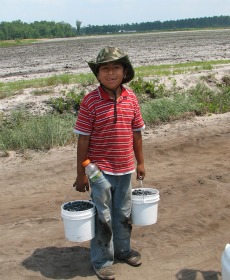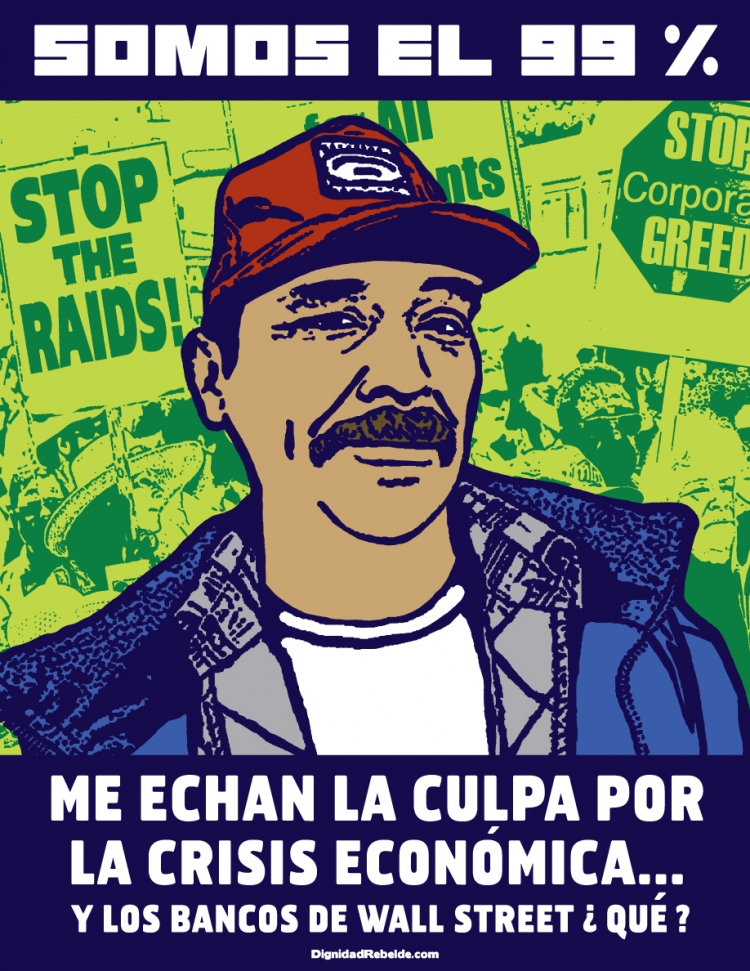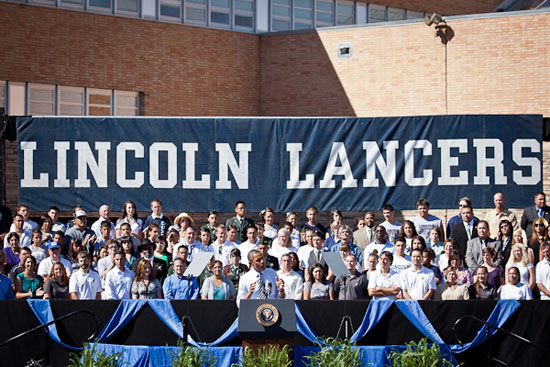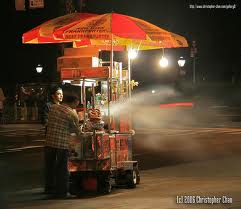(English → Français) View originalTranslators:
NPR: Realities of Immigration Legislationgkuql2nfsjxte9cw7i0s7cxie6tdiwog
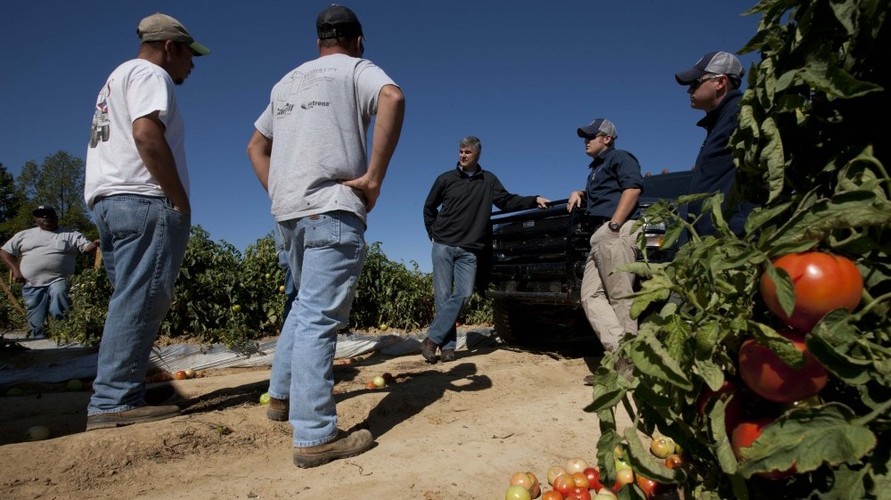
State Sen. Scott Beason, R-Gardendale (center) talks with tomato farmers about the new Alabama immigration law on Chandler Mountain in Steele, Ala. Beason, who helped draft the measure, said he was sticking by the law although he would try to find relief for farmers who rely on migrant workers to harvest their crops.7i2h2be03bybhosfn75bznauykdb6miw
October 8, 2011xjqlxh6mli92nr0hzvlsfchfb014o8si
Whatever you think about the immigration policy in the United States, there is clearly the law and then there is reality.e5qtp72zjdjsge664mlgzlym9bbc7gl4
The immigration issue is often debated in terms of justice, rights and the protection of our borders, but there’s a business story to be told as well. The question is: Can the U.S. economy really function without undocumented workers?dey40az5mpi5de0oulnxafcjm776ctud
Gordon Hanson, an economist specializing in the impacts of immigration, studies the reality side of things at University of California-San Diego. He says that for decades there has been an unwritten social contract that says the U.S. isn’t going to make it easy for immigrants to get in; there will be physical barriers and it will cost time, money and personal risk.drnebmdnkfqo9at75cmwvqwobcbp7ijf
“What that did in effect was to select out people who weren’t serious, to select out people for whom the opportunity of being in the United States didn’t matter that much,” Hanson tells weekends on All Things Considered guest host Robert Smith.wnqp6o3vr5t2q6jc91l4c14kaluvh6t3
This policy was good for businesses and the workers who made it across the border. It created an ideal workforce of individuals focused on working, as long they were able to produce identification, valid or not, Hanson says.wy7xgcx6hcayndpyi777p6mnfd8sj0g0
Jeremy Gonzalez picks tomatoes on a farm in Steele, Ala. Much of the crop is rotting as many of the migrant workers who normally work these fields have moved to other states to find work.f0lzqtmhtcqv0g6crbmmdszzjp9u8g7u
There were flaws, but from a business point of view, this system was stable and predictable, Hanson says. Businesses could plan based on the reality of immigration enforcement. But tougher new laws in Alabama and Arizona changed all of that, amounting to what Hanson says is chaos.xql72vdy3qcg4xaz1096gxn40py882mu
“[It’s] piecemeal reform undertaken at the state level with different states doing different things, making it harder for employers to hire illegal immigrants,” Hanson says. “Employers just don’t know what to think about what’s going to come down the pike next.”wq800crjtiocuuoffl5u568e0i9f4nab
That’s what’s happening on Jamie Boatwright’s farm on Chandler Mountain in Alabama. His large variety of tomatoes are ripe and ready to pick, but there’s a problem — no pickers. Most of Boatwright’s usual workers left Alabama after the new immigration law went into effect in the state.yl6lifcczjlb6pjc05ls30itefl25f0f
The law allows police to detain anyone they suspect of being an undocumented immigrant. Kids can’t go to school without proving they are U.S. citizens. Many of the field workers in Alabama have fled to Florida, where there are fields with better work and no hassles. Boatwright says he never knows how many pickers will show up.hwxri8w3h0fn9ch7xkjnlqivyubu3uoc
“It varies from day to day. Sometimes we have six, sometimes we have seven, sometimes eight,” he says. “It just depends [on] their level of anxiety toward being able to come to work that day.”pl4oykj5lr7cpq1do6tttust958u7xf4
Why The Change y44gbk0qgqrmjw94egbgh5nfuikzfch4
Republicans say the government should stop interfering in business and making life unpredictable for businesses. And yet, Republicans passed this law in Alabama and that’s exactly what it does.r628ofduuwxdi8cayqa7ay7pagqhqz7b
Alabama state Sen. Scott Beason, who sponsored the bill, says the status quo needed to change because businesses were being forced to hire undocumented workers if a competitor did so in order to keep their own business afloat.0xo1bbbpn2bp4k43kskwnntfne60rgjt
“As they undercut the prices for their subcontractors, you begin to see people no longer in the drywall business, [it’s] more difficult to be in the painting business, bricklaying or that sort of thing,” Beason says, using the example of a construction company. “So over the years you end up with a big problem growing where more and more people hire more and more illegals.”roffp9846klw0246ozpsbnszw83gki2v
Beason is now hearing complaints from local businesses that say it is difficult for them to hire workers and keep their businesses running, but he says that fixing any problem takes a period of adjustment.54unpt8qyrb53v0pz0skfjki59k7uhmz
“It is not going to be smooth and easy for every single person,” he says, “especially if you’ve been out there basing your business, basing your livelihood, on breaking the law and hiring an illegal workforce.”rrexcc3ahhgzdho0a0lvo0tloxv0ndyt
Beason says the state did its job to warn businesses that the new law was coming and it is unfortunate that many businesses did not change the way they did business to get over the last few weeks of harvest. He also says, despite what some people believe, he thinks Americans are willing to do these jobs.tawvcribqo7gdtom7imxay9k8aio08p7
“There may have to be some differences in pay scale … but Alabamians and Americans will do those jobs,” he says.7immc632bc6hhbclvlkckpajg30jo2of
The Wage Theoryqdw0hlgvcd9c342xrhvpfp12compwnmr
Some economists theorize that without all those undocumented immigrants, the supply of labor will dry up and businesses will have to pay more to attract new, legal workers. Tomatoes end up costing more, but Alabama’s 10 percent employment rate goes down.bjkxuy2ya98a2b0qseaf2oyujjmjiqsn
But the theory isn’t working so far at Boatwright’s farm.nlmdaom31mu6hxvkgjatlt8fw6ysam5g
“Since this law went in to effect, I’ve had a total 11 people that were Americans come and ask for work,” Boatwright says. “A total of one of those actually came back the next day.”zzk9oajh6tzlwppn2ma4dfspglfbxs24
That one worker picked about four boxes of tomatoes before leaving the field and quitting, Boatwright says. He says picking crops in the fields is a specialized skill that Americans just aren’t accustomed to doing.m1vy0c5z56ion8ybmpboo60itmsbb36y
If Boatwright were to raise his wages in order to attract workers, he’d have to also raise the prices of his tomatoes. A price hike would not allow him to compete with the lower prices of tomatoes from neighboring states without tough immigration laws.mlhm9hiexg1pnx1xb7ayldvgc4i7dbs1
Boatwright’s wife, Lana, says she fears how this will end.ldvcsoeb0x589idwi3ivj0nfjs52dbpk
“This problem is not going to go away for the state of Alabama,” she says. “The farmers may go away from the state of Alabama, some of the industry may go away from the state of Alabama, but there’s not a Band-Aid you can put on this to fix it quickly.”sw8itzu6uchvp5wwr4dwnigcxkhteilv
There is hope, however, but it requires an economic recovery.379y6ke3f6f4vrw3mryl5xnf2ae6lnpr
“What we’ve seen after every U.S. recession … is once the demand for labor really starts to pick up, what happens is those same politicians who were preaching a tough line on immigration suddenly get softer,” says Hanson from University of California.0w9vdzn37wnkxiv6zfk118sq6w51a6jy
Hanson says these new laws are so tough, though, it may be difficult to go back — if the law stays in effect. The U.S. Justice Department has asked an appeals court to look at the constitutionality of Alabama’s law.ty6bj3tcee5b6ownh3e13g2flp1fpf5v
Related NPR Storiesmsx08exmkiio2en9f0d60oj3h12bvnk4
(original) View Français translation
NPR: Realities of Immigration Legislation

State Sen. Scott Beason, R-Gardendale (center) talks with tomato farmers about the new Alabama immigration law on Chandler Mountain in Steele, Ala. Beason, who helped draft the measure, said he was sticking by the law although he would try to find relief for farmers who rely on migrant workers to harvest their crops.
October 8, 2011
Whatever you think about the immigration policy in the United States, there is clearly the law and then there is reality.
The immigration issue is often debated in terms of justice, rights and the protection of our borders, but there’s a business story to be told as well. The question is: Can the U.S. economy really function without undocumented workers?
Gordon Hanson, an economist specializing in the impacts of immigration, studies the reality side of things at University of California-San Diego. He says that for decades there has been an unwritten social contract that says the U.S. isn’t going to make it easy for immigrants to get in; there will be physical barriers and it will cost time, money and personal risk.
“What that did in effect was to select out people who weren’t serious, to select out people for whom the opportunity of being in the United States didn’t matter that much,” Hanson tells weekends on All Things Considered guest host Robert Smith.
This policy was good for businesses and the workers who made it across the border. It created an ideal workforce of individuals focused on working, as long they were able to produce identification, valid or not, Hanson says.

Jeremy Gonzalez picks tomatoes on a farm in Steele, Ala. Much of the crop is rotting as many of the migrant workers who normally work these fields have moved to other states to find work.
There were flaws, but from a business point of view, this system was stable and predictable, Hanson says. Businesses could plan based on the reality of immigration enforcement. But tougher new laws in Alabama and Arizona changed all of that, amounting to what Hanson says is chaos.
“[It’s] piecemeal reform undertaken at the state level with different states doing different things, making it harder for employers to hire illegal immigrants,” Hanson says. “Employers just don’t know what to think about what’s going to come down the pike next.”
That’s what’s happening on Jamie Boatwright’s farm on Chandler Mountain in Alabama. His large variety of tomatoes are ripe and ready to pick, but there’s a problem — no pickers. Most of Boatwright’s usual workers left Alabama after the new immigration law went into effect in the state.
The law allows police to detain anyone they suspect of being an undocumented immigrant. Kids can’t go to school without proving they are U.S. citizens. Many of the field workers in Alabama have fled to Florida, where there are fields with better work and no hassles. Boatwright says he never knows how many pickers will show up.
“It varies from day to day. Sometimes we have six, sometimes we have seven, sometimes eight,” he says. “It just depends [on] their level of anxiety toward being able to come to work that day.”
Why The Change
Republicans say the government should stop interfering in business and making life unpredictable for businesses. And yet, Republicans passed this law in Alabama and that’s exactly what it does.
Alabama state Sen. Scott Beason, who sponsored the bill, says the status quo needed to change because businesses were being forced to hire undocumented workers if a competitor did so in order to keep their own business afloat.
“As they undercut the prices for their subcontractors, you begin to see people no longer in the drywall business, [it’s] more difficult to be in the painting business, bricklaying or that sort of thing,” Beason says, using the example of a construction company. “So over the years you end up with a big problem growing where more and more people hire more and more illegals.”
Beason is now hearing complaints from local businesses that say it is difficult for them to hire workers and keep their businesses running, but he says that fixing any problem takes a period of adjustment.
“It is not going to be smooth and easy for every single person,” he says, “especially if you’ve been out there basing your business, basing your livelihood, on breaking the law and hiring an illegal workforce.”
Beason says the state did its job to warn businesses that the new law was coming and it is unfortunate that many businesses did not change the way they did business to get over the last few weeks of harvest. He also says, despite what some people believe, he thinks Americans are willing to do these jobs.
“There may have to be some differences in pay scale … but Alabamians and Americans will do those jobs,” he says.
The Wage Theory
Some economists theorize that without all those undocumented immigrants, the supply of labor will dry up and businesses will have to pay more to attract new, legal workers. Tomatoes end up costing more, but Alabama’s 10 percent employment rate goes down.
But the theory isn’t working so far at Boatwright’s farm.
“Since this law went in to effect, I’ve had a total 11 people that were Americans come and ask for work,” Boatwright says. “A total of one of those actually came back the next day.”
That one worker picked about four boxes of tomatoes before leaving the field and quitting, Boatwright says. He says picking crops in the fields is a specialized skill that Americans just aren’t accustomed to doing.
If Boatwright were to raise his wages in order to attract workers, he’d have to also raise the prices of his tomatoes. A price hike would not allow him to compete with the lower prices of tomatoes from neighboring states without tough immigration laws.
Boatwright’s wife, Lana, says she fears how this will end.
“This problem is not going to go away for the state of Alabama,” she says. “The farmers may go away from the state of Alabama, some of the industry may go away from the state of Alabama, but there’s not a Band-Aid you can put on this to fix it quickly.”
There is hope, however, but it requires an economic recovery.
“What we’ve seen after every U.S. recession … is once the demand for labor really starts to pick up, what happens is those same politicians who were preaching a tough line on immigration suddenly get softer,” says Hanson from University of California.
Hanson says these new laws are so tough, though, it may be difficult to go back — if the law stays in effect. The U.S. Justice Department has asked an appeals court to look at the constitutionality of Alabama’s law.





